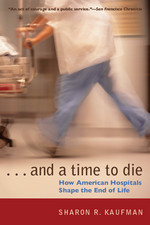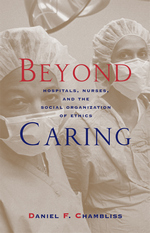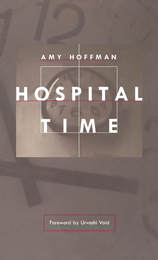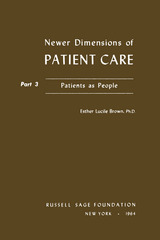
“An act of courage and a public service.”—San Francisco Chronicle
“This beautifully synthesized and disquieting account of how hospital patients die melds disciplined description with acute analysis, incorporating the voices of doctors, nurses, social workers, and patients in a provocative analysis of the modern American quest for a ‘good death.’”—Publishers Weekly
“Kaufman exposes the bureaucratic and ethical quandaries that hover over the modern deathbed.”—Psychology Today
“Kaufman’s analysis illuminates the complexity of the care of critically ill and dying patients [and] the ambiguity of slogans such as ‘death with dignity,’ ‘quality of life,’ and ‘stopping life support.’ . . . Thought-provoking reading for everyone contemplating the fate of us all.”—New England Journal of Medicine

Based on more than ten years' field research, Beyond Caring is filled with eyewitness accounts and personal stories demonstrating how nurses turn the awesome into the routine. It shows how patients, many weak and helpless, too often become objects of the bureaucratic machinery of the health care system and how ethics decisions, once the dilemmas of troubled individuals, become the setting for political turf battles between occupational interest groups. The result is a compelling combination of realism and a powerful theoretical argument about moral life in large organizations.

Maligned by the public and manipulated by politicians, today's city hospitals often cannot keep pace with the rising costs of medical technology. But while the urban landscape decays around them and city officials debate their continued existence, these institutions provide primary care for many of the nation's poor, and technically advanced care for some. They also serve as training grounds for many health professionals. How city hospitals have progressed so far, only to face such an uncertain future, is the subject of this clearly written and meticulously researched history.
Drawing on his personal experience as a physician and administrator, Harry F. Dowling shows that many problems facing city hospitals in the 1980s can be traced to their bleak beginnings as adjuncts to the poorhouse. Occasionally they provided satisfactory custodial care for the indigent sick, along with medical treatment comparable to the best private hospitals; more often their wards were scantily staffed with incompetent, careless attendants and characterized by filth, overcrowding, and epidemics that turned hospitals into death houses. Dr. Dowling describes how the gradual affiliation of city hospitals with medical schools, as well as the professionalization of nursing and administration, brought about the transition from almshouse to modern medical center. But by the 1960s deteriorating buildings and dwindling budgets again raised questions about the city hospital's role in today's medical establishment.
This book discusses a number of issues that will have a direct bearing on the future viability of these hospitals. Of particular significance will be their willingness to respond creatively to the needs of the surrounding community through emphasis on preventive medicine, family services, and care of the chronically ill.

This collection of thirty-one cases and commentaries addresses ethical problems commonly encountered by the average health care professional, not just those working on such high-tech specialties as organ transplants or genetic engineering. It deals with familiar issues that are rarely considered in ethics casebooks, including such fundamental matters as informed consent, patient decision-making capacity, the role of the family, and end-of-life decisions. It also provides resources for basic but neglected ethical issues involving placement decisions for elderly or technologically dependent patients, rehabilitation care, confidentiality regarding AIDS, professional responsibility, and organizational and institutional ethics.
The authors describe in detail the perspectives of each party to the case, the kind of language that ethicists use to discuss the issues, and the outcome of the case. A short bibliography suggests useful articles for further reading or curriculum development.
Easily understood by readers with no prior training in ethics, this book offers guidance on everyday problems from across the broad continuum of care. It will be valuable for health-care professionals, hospital ethics committees, and for students preparing for careers in health-care professions.

Originally published in 1999, this classic textbook includes twenty-six cases with commentary and bibliographic resources designed especially for medical students and the training of ethics consultants. The majority of the cases reflect the day-to-day moral struggles within the walls of hospitals. As a result, the cases do not focus on esoteric, high-tech dilemmas like genetic engineering or experimental protocols, but rather on fundamental problems that are pervasive in basic healthcare delivery in the United States: where to send a frail, elderly patient who refuses to go to a nursing home, what role the family should play in making a treatment decision, what a hospital should do when it is getting stuck with too many unpaid bills.
This thoroughly revised and updated second edition includes thirteen new cases, five of which are designated as "skill builder" cases aimed specifically at persons who wish to conduct clinical ethics case consultations. The new cases highlight current ethical challenges that arise in caring for populations such as undocumented immigrant patients, persons with substance use disorders involving opioids, and ethical issues that arise beyond the bedside at the organizational level. The reader is invited to use the supplemental videos and assessment tools available on the website of the Loyola University Chicago ACES project (www.LUC.edu/ethicsconsult).

Hoffman became central to Riegle’s caregiving when he asked her to be his health-care proxy, and although she willingly chose to do this, she explores her conflicting feelings about herself in this role and about her involvement with Riegle and his grueling struggle with hospitalization, illness, and, finally, death. She tells of the waves of grief that echoed throughout her life, awakening memories of other losses, entering her dreams and fantasies, and altering her relationships with friends, family, and even total strangers.
Hoffman’s memoir gives voice to the psychological and emotional havoc AIDS creates for those in the difficult role of caring for the terminally ill and it gives recognition to the role that lesbians continue to play in the AIDS emergency. A foreword by Urvashi Vaid, former executive director of the National Gay and Lesbian Task Force, offers a meditation on the politics of AIDS and the role of family in the lives of lesbians and gay men.


States are increasingly important players in the current efforts to reform U.S. health care, as the federal government withdraws from this responsibility. Robert B. Hackey analyzes the varied routes states have taken in reformulating health care policy and provides a road map of what specific strategies work and why.
In this comparative case study, Hackey focuses on four states—Massachusetts, New Hampshire, New York and Rhode Island—that have had markedly different experiences with regulating health care over the past two decades. Hackey's detailed comparisons show how the states' policies changed over time, moving from regulatory to market-oriented solutions, and examines which policy programs appear best poised to meet the future.
Hackey uses regime theory to explain how the states' policy choices concerning cost control and entry regulation were shaped by the prevailing political culture and institution of each state. He concludes that the autonomy of state government form special interests is vital to the successful adoption, implementation and outcome of state initiatives.
Rethinking Health Care Policy offers policymakers, planners and specialists useful insights into the politics of state regulation and into future directions for health care reform.
READERS
Browse our collection.
PUBLISHERS
See BiblioVault's publisher services.
STUDENT SERVICES
Files for college accessibility offices.
UChicago Accessibility Resources
home | accessibility | search | about | contact us
BiblioVault ® 2001 - 2024
The University of Chicago Press









